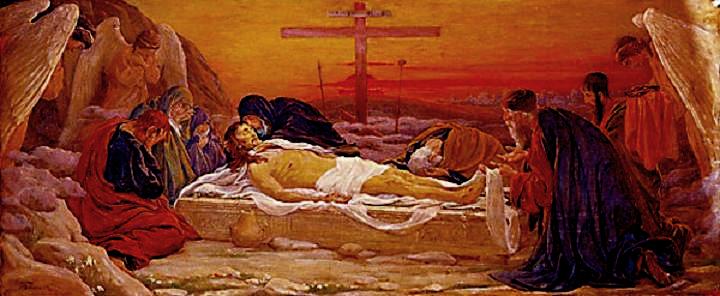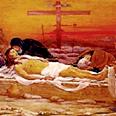by St. Amphilocius of Iconium

Delivered on Great and Holy Saturday
1. Let us commemorate today the solemnity of the burial of Our Saviour. He has undone the bonds of death of those who were in hades, filled hades with His splendour, and roused from sleep those lying there; and we on earth rejoice exultant, recalling to mind His Resurrection, and now we fear death no more, for it shall not prevail against immortality.
Because Thou wilt not, says the Scripture, give Thy Holy One to see corruption (Ps. xv.10).
It may be that the Jews and the Greeks will laugh at our wisdom; the former looking for another Christ, the latter bringing their own hopes to an end in the grave; of whom the prophet has rightly said:
And their sepulchres shall be their houses forever (Ps. xlviii.12).
They now laugh, but they shall weep: for they shall weep when
they look upon Him Whom they have pierced (Zach, xii.10; Ps. xxi.16),
and tormented with injuries.
We now weep, but our grief will be tempered with joy.
Death has seized Our Lord Jesus Christ; but shall not keep its hold on Life. It swallowed Him; it swallowed Him, not knowing Him: but, with Him, it will give up many. Of His own will He is now held; tomorrow, He shall rise again, and hades shall be emptied.
Yesterday, on the Cross, He darkened the sun’s light, and behold in full day it was as night; today death has lost its dominion; suffering itself a kind of death. Yesterday the earth mourned, contemplating the evil hate of the Jews, and in sadness clothed itself in a garment of darkness.
Today, the people that walked in darkness have seen a great light (Is. ix. 2).
Yesterday the earth trembled, as though it would dissolve, threatening to swallow those who dwelt in it; and the mountains were cleft asunder, the rocks were split, the Temple appeared as though naked, and as though it were a living being threw off its veil, seeking as it were to show by what had happened to itself that its holy places were no longer sacred to the Lord. They that suffered these things were lifeless, without mind. The elements mourned, as though it wanted little for them to dissolve in chaos, and bring disaster on the world, were it not that they could see the purpose of their Maker: namely, that of His own will He suffered.
2. O new and unheard of happening! He is stretched out upon a Cross Who by His word
stretched out the heavens (Is. li.13).
He is held fast in bonds
Who has set the sand a bound for the sea (Jer. v. 22).
 He is given gall to drink Who has given us wells of honey. He is crowned with thorns Who has crowned the earth with flowers. With a reed they struck His Head Who of old struck Egypt with ten plagues, and submerged the head of Pharaoh in the waves. That countenance was spat upon at which the Cherubim dare not gaze. Yet, while suffering these things He prayed for His tormentors, saying:
He is given gall to drink Who has given us wells of honey. He is crowned with thorns Who has crowned the earth with flowers. With a reed they struck His Head Who of old struck Egypt with ten plagues, and submerged the head of Pharaoh in the waves. That countenance was spat upon at which the Cherubim dare not gaze. Yet, while suffering these things He prayed for His tormentors, saying:
Father, forgive them, for they know not what they do (Lk. xxiii. 34).
He overcame evil by goodness. Christ undertook the defence of those who put Him to death: eager to gather them into His net, annulling the charge, and pleading their ignorance. Made the sport of their drunken frenzy, He submitted without bitterness. He suffered their drunkenness, and in His love for mankind called them to repentance. What more could He do?
Profiting nothing from that goodness, they enclose Him in a tomb Whom creation cannot contain. They seal the tomb, safe-guarding our deliverance; and fearing He would rise again, they station soldiers to watch the sepulchre. Who has ever seen the dead placed under watch?
Or rather, who has ever seen a dead body treated as an enemy? Who has ever seen one struck by death causing fear to those who have slain him? Who fears his enemy, once he has killed him? And who will not forget his enmity when sated by the death of his adversary?
Why do you still fear Him, ye Jews, Him Whom you have done away with?
Why do you dread Him Whom you have slain?
Why do you still dread Him Who has gone forth from among the living?
Why do you fear the Dead?
Why do you still fight with One Whom you have crucified?
His slaughter has made you safe: rest secure. If it is a mere man who has died, he will not rise again. If it is a mere man has died, then there is no truth in those words of His:
Destroy this temple, and in three days I will raise it up.
If He was a mere man, then death will keep him. If He was a mere man, what need to seal His tomb: is it not useless? Wait till the third day, and see the disproof of His madness? Cease to labour in vain, and you will see what comes to pass. Cease to rage against the truth. Do not try to wage war against God, inflicting wounds only on yourself. Cease offering insults to
the Sun of Righteousness,
thinking you can put out its light. Cease I say, and do not try to seal up the fountain of life.
Do not begin to make difficulties for yourself.
Do not speak of guards.
Have no traffic with corruption; and the bribing of those who keep watch.
Do not attempt what is foolish; nor spend what you have in impiety; nor imagine that you will defeat God.
Do not give money to the soldiers, to say this and not that. Do not set a crowd to watch the tomb. P
ut not your trust in armour. The Resurrection will not be stopped by force of arms, nor impeded by seals, nor put down by soldiers, nor concealed by bribes. Rather it shall be believed in.
Have you not seen Lazarus a little while ago throw off death as though it were a sleep? Have you not seen him come forth, clothed in his cerements (burial rags), at the words: Come forth? Have you not seen the dead obedient to His voice when He bade him come: and the winding sheet did not prevent Him? Have you not seen how His voice restored a man already dissolving in death? He Who did that can also do this.
He Who raised His Own servant, much more shall He Himself be raised up. He Who gave life again to a body already corrupting shall not leave Himself in death.
The great blindness of the Jews, who, beholding these wonders, yet could not see: For, they have eyes and see not!
For, the god of this world hath blinded the minds of unbelievers, that the light of the Gospel may not shine unto them (Ps. cxiii. 5; 11 Cor. iv. 4). But let us for a time leave these unhappy ones in their unbelief, and let us, while contemplating in spirit the tomb of our Saviour, say with the faithful Mary: They have taken away our Lord, and we know not where they have laid Him.
To Him and to the Father Undefiled, together with the Holy Spirit, be there glory for ever and ever. Amen.
